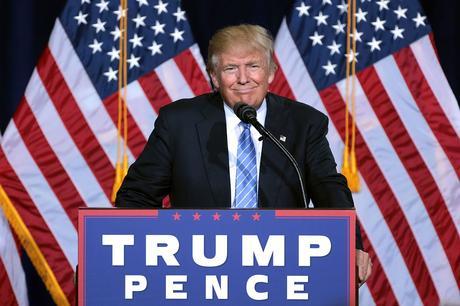
We can’t let him legislate our bodies.
May was not a good month for women’s health care. On May 4, a Republican-dominated House of Representatives passed the American Health Care Act (AHCA), which proposes to tighten existing regulations on contraceptive access and maternity care and to cut Planned Parenthood from the federal budget. On the same day, Trump signed a “religious liberty” executive order that allows organizations to limit their employees’ access to contraception and abortion based on the organization’s faith. Then, on May 23, the administration released its 2018 budget proposal, which Dawn Leguens, the vice president of Planned Parenthood Federation of America, called the “worst budget for women and women’s health in a generation.”
Under Trumpcare, simply being a woman is considered a pre-existing condition. Historically, insurers have treated occurrences of domestic violence, sexual assault, pregnancy, Caesarean sections, and postpartum depression as “preexisting conditions,” and have charged women more or denied women coverage based on them. The AHCA would also make pregnancy more expensive, and the religious liberty executive order would make birth control harder to obtain. While the Affordable Care Act required insurers to cover certain essential health services like mammograms, birth control, and prenatal and maternity care, if this requirement is scrapped, insurers would not have to offer such services and/or could make coverage for services like maternity care prohibitively expensive.
No previous budget has ever attempted to exclude a specific health care provider from receiving federal funding, but Trump’s proposed 2018 budget explicitly states that Planned Parenthood is not to receive any funding from the federal government. This means that Planned Parenthood would be barred from participating in any federal program, including cancer screening programs funded by the Centers for Disease Control and Prevention, Zika virus prevention, and HIV/AIDS testing and prevention. Currently, Planned Parenthood receives about $500 million per year from the government, in the form of coverage for services like contraception, cancer screening, and STI testing and treatment. While this cut was presumably meant to target Planned Parenthood’s abortion services, federal law already prevents any taxpayer dollars from being used to pay for abortions. What’s more, over one million patients who visit Planned Parenthood centers every year rely on Medicaid for their health coverage, but under the AHCA, funding for Medicaid would be slashed by billions and patients would no longer be able to use Medicaid for care at Planned Parenthood Centers. The budget also includes $880 billion in cuts to Medicaid, which women disproportionately rely on. Trump’s proposed budget hurts women around the nation, especially impacting low-income women.
Unsurprisingly, 71 percent of young women across the nation oppose the Republican plan to replace Obamacare. In comparison, 73 percent of young women support Obama’s Affordable Care Act (ACA) and 84 percent support the ACA’s requirement that insurers provide coverage for maternity care. These young women aren’t alone—the majority of Americans as a whole think that they would be worse off under the Republicans’ AHCA than Obama’s ACA.
To understand how we ended up with a health care proposal so out-of-step with most Americans’ desires for health insurance, we have to first understand who wrote this legislation. White men of privilege disproportionately hold the power to make decisions that govern how women of all races, ethnicities, and socioeconomic statuses live their lives. Last month, for example, President Trump and Vice President Mike Pence met with the House Freedom Caucus to talk about revising the AHCA. That caucus was made up entirely of men. Trump also signed his anti-abortion executive order surrounded by men. In fact, Trump’s cabinet is more white and more male than any cabinet since Reagan. Only four members of his cabinet are women. Very few women have power or say in the upper levels of the Trump administration, which becomes incredibly problematic when issues such as women’s health and reproductive rights are at stake.
Ivanka Trump is one woman who holds such power. Yet for somebody who markets herself as a passionate advocate for the education and empowerment of women and girls, she has remained remarkably quiet on the issues of reproductive rights and health care access for low-income women at stake in the new health care legislation and budget proposal. Ivanka seldom, if ever, advocates for women’s reproductive health in her capacity as assistant to the president. Clearly, she knows that talking about birth control is more polarizing than promoting a vague, nonthreatening message of women’s “empowerment.” But it’s pretty hard to advocate for women’s empowerment without advocating for their reproductive health, and Ivanka is choosing to ignore this connection. Birth control has greatly expanded American women’s access to opportunities for educational attainment and economic advancement. According to the Guttmacher Institute, “being able to get the pill before age 21 is considered the most influential factor in enabling women already in college to stay in college.” Thus far, by remaining silent about her father’s rollbacks on women’s health care, Ivanka Trump and her selective brand of feminism have failed American women where they need her most.
As a young woman who will soon enter the workforce, pay for my own insurance, and eventually, start a family, I am wary of the implications Trump’s proposed legislation—the 2018 budget, the American Health Care Act, and the “religious liberty” executive order—holds for me as well as the future of our country. Ultimately, this legislation will only further drive inequality in our nation between men and women, between low-income families and the rest of the nation, and between the federal government and its constituents. If the Senate passes it in its current form, Trumpcare will not serve anybody but the privileged white men who proposed it in the first place.

